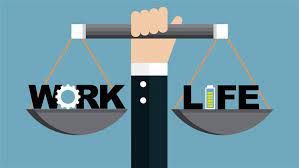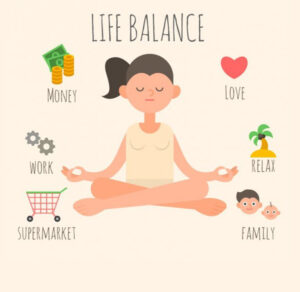Work-life balance is more important than you might think and the importance of maintaining it for your mental health. It’s easy to get caught up in work or other commitments, but what about taking care of yourself? Take some time out of your day to make sure you’re getting enough exercise, eating well, and getting enough sleep. Maintaining a good balance between your obligations at home and outside work will help ensure that stress doesn’t take over!
Contents
- 1 What Is Work-Life Balance?
- 2 Importance Of Work-life Balance
- 3 How Do You Achieve Work-life Balance?
- 4 Ways To Reduce Work Stress
- 5 How To Relax And Destress After A Long Day?
- 6 Improve Your Work-Life Balance with Mindfulness
- 7 Importance Of Sleep For Work-Life Balance
- 8 10 Ways To Manage Work-life Balance Without Quitting Your Job
- 9 Conclusion
What Is Work-Life Balance?

When it comes to the question of work-life balance, there is no one answer that fits everyone. In fact, what matters most when it comes to striking the right balance between work and the rest of your life may vary from day to day or even hour to hour! That said, there are a few key things to keep in mind when it comes to creating a healthy balance in your life.
Work-life balance is the idea that you should have time for both your personal and work life. Ideally, an individual who has a strong sense of work-life balance will be able to bring the same energy and focus to their job as they do to their family and other activities. Experts suggest that people should spend time in the same amount of hours on their job and personal life.
Importance Of Work-life Balance

Work-life balance is important because it allows you to have time for both work and your personal life. It can help you to be more productive at work and can make you happier overall. There are a few things you can do to achieve a better work-life balance, such as setting boundaries between your work and personal life, scheduling time for yourself, and saying no to requests that will interfere with your personal time.
Productivity
Work-life balance will help you to be more productive at your job and also make you happier overall. You’ll feel less stressed out and exhausted when you take time for yourself. This can allow you to work more efficiently during the other parts of the day. You’ll also have a lot more energy when you spend time with friends and family. This is something that can help you to be more successful at work.
Happiness
Work-life balance allows you to have time for both your job and your personal life. You should try to schedule a certain number of hours for work. And a certain number of hours for your personal life. Work-life balance can also help you to set boundaries between your work and personal life. So that you don’t have a blurred line between the two. This will only make it harder for you to handle each separately. You should also try to say no sometimes when co-workers ask you to stay late. Or if your boss wants you to do something outside of work. So that you can stay focused on your personal life.
How Do You Achieve Work-life Balance?

- Make time for yourself. It can be all too easy to get wrapped up in work and other commitments and forget to take care of yourself. But it’s important to set aside time each day for activities that you enjoy and that help you relax and destress. Whether it’s reading, going for a walk, or taking a bubble bath, the key is to give yourself time to recharge your batteries!
- Don’t sweat the small stuff. When you’re stressed out or overwhelmed, it’s often tempting just to let things go and cross your “to do” list off for another day. However, sometimes starting with smaller tasks can help you get more organized and feel more in control. For example, if you have a big project due at work, start by tackling filing or cleaning up your desk to help get the ball rolling.
- Make time for loved ones. It’s easy to get wrapped up in obligations and forget about prioritizing people who are important to you! When it comes to relationships with family and friends, it’s important to make time for them in your busy schedule. Even if it’s just a quick phone call or a weekly dinner together, having these positive interactions can be very beneficial to everyone involved!
- Scheduling is key. Of course, you’re going to have some obligations that are harder to avoid than others, but scheduling them in advance can help you stay on top of things. For example, if you have a busy workday ahead, try setting out your clothes before you go to bed so that you aren’t rushing around in the morning! Or, for weekend plans with friends, consider scheduling one night where it’s “no text messaging” allowed (so that you can spend time together).
- Recognize your limits. Sometimes, no matter how hard you try to strike a good balance, things aren’t going to go as planned and it’s important to be able to recognize your limits (and not take on too much!). If you find yourself getting overwhelmed by commitments or obligations, make sure that you communicate this to the people around you so that they are understanding.
- Take some time off. Besides family and friends, it’s important to schedule time for yourself – even if this means taking a day (or two) where “work” is completely off of your agenda! Taking time to relax and enjoy yourself can help recharge your batteries and keep stress at bay.
Ways To Reduce Work Stress

Work-life balance is something that everyone struggles with sometimes. But if this is becoming a serious problem in your life. It may be time to talk to someone about your stress. Work-life balance expert Lisa Weinerman shares four free ways to reduce stress.
1) Know yourself. You can’t get rid of what’s stressing you if you don’t know why or when it happens in the first place. So pay attention to how your body reacts when you’re about to blow up in anger. Or start tearing the house apart looking for your misplaced cell phone.
2) Make a plan. Come up with ideas to deal with things that make you mad before they become unmanageable. Like using deep breathing or taking time out of your workday to go on a walk around the block.
3) Get organized. Cleaning out your closets or organizing your desk can provide much-needed mental clarity. Plus it feels good to make room for the things you love.
4) Find a way to breathe. One of the most effective ways to reduce anger and anxiety is deep breathing exercises. It takes only ten minutes but can make an enormous difference in how you feel. It can even lower your blood pressure and help you live longer.
Most people experience some form of stress during their lives. However, when stress becomes chronic and begins to interfere with your everyday life, it could be a sign that your work-life balance is off. The following ten quick tips can help you improve your quality of life by improving the balance between professional life and personal life. 1. Be realistic. It’s important to be realistic about what you can and cannot do in a given day or week by setting priorities for yourself and sticking to them. 2. Say “no” when necessary. When someone asks you to take on an extra project or attend a work-related social function that will require additional hours,
How To Relax And Destress After A Long Day?

Everyone has different ways of relaxing and destressing after a long day. Some people like to take a bath, others may prefer to read a book or watch TV. However, there are a few things that everyone can do to help them relax and unwind.
1) Take a break. Sometimes the best way to relax is to take a break from work. Step away from your desk for a few minutes and take a walk around the block, or go outside and get some fresh air.
2) Connect with nature. A great way to de-stress is to connect with nature. Spend time outside in the sun or go for a walk in the park.
3) Listen to music. Sometimes all you need is a little background noise and that can be music. Put on some headphones and tune in to your favorite station or play an album from your collection.
4) Get a massage. If you don’t have time for a full-on massage, try giving yourself one at the end of the day with a tennis ball.
5) Take a break from technology. Whether you’re at home or at work, it’s important to take a break from your phone, laptop, etc. doing something else for a little while can help you relax and unwind.
6) Make time for meditation or yoga. Breathing exercises are great because they are easy to do and take very little time. They also help you relax and focus on the present moment, which can be a great stress reliever after a long day.
7) Do something you enjoy. Everyone has something they enjoy doing whether it’s going out with friends or playing an instrument. Whatever that is for you, make sure to take some time out of your day to do it.
8) Reward yourself. At the end of a long day, give yourself a little treat whether it’s going to the movies or eating a pint of ice cream. It doesn’t have to be expensive – just something that will put a smile on your face and make you feel good!
Improve Your Work-Life Balance with Mindfulness

Work-life balance is an important part of overall health and well-being. But it can be incredibly difficult to maintain this balance when you feel overwhelmed by work, family demands, or other responsibilities! Fortunately, there are some simple things that you can do on a daily basis to help improve your work-life balance and to ease stress. Such as:
- Set limits. It can be tough to say “no” sometimes, but setting limits on the things you do (and don’t) do each day is important for improving your work-life balance. For example, if someone asks you to take on an extra project, be sure to consider how it will affect your current commitments and obligations before agreeing.
- Practice mindfulness. Mindfulness is all about focusing on the present (and not worrying about the past or future). By practicing mindfulness in little ways throughout your day, you can help improve your sense of calm and well-being – which is important for those stressful days at work. For example, if you’re feeling overwhelmed by a co-worker, try to take a deep breath and remain calm instead of reacting right away!
- Get moving! Exercising can help reduce stress and improve your mood – which is important for maintaining a healthy work-life balance. Plus, it doesn’t have to be a strenuous workout. Even walking around the neighborhood or doing some stretches during your next coffee break can help you feel better throughout the day!
- Create healthy boundaries. By establishing healthy boundaries with others, you’ll feel more empowered and in control of your life. For example, if there are certain people at work who are giving you a hard time with their demands, be sure to let them know that you’re not willing (or able) to do everything they ask.
- Have some fun! It’s important to make time for fun and relaxation each day – even if it’s only for 15 minutes or so. Try turning on your favorite music and dancing around the house, or visiting a nearby park and going for a stroll. Not only will you feel better, but it’s a great way to take a break from all of your responsibilities!
Importance Of Sleep For Work-Life Balance

Sleep is crucial to helping your body recover from the physical stress put on it during the day. Getting quality sleep will also allow you to feel more refreshed and energetic. Without this, you’ll find yourself less focused at work, less productive overall, and in some cases even sick.
- Set a bedtime schedule. Having a bedtime schedule will help you to get the amount of sleep you need each night so that you can wake up feeling refreshed and ready to take on the day.
- Make your bedroom conducive to sleep. Keep it cool, dark, and quiet. If there are lights or noises keeping you awake at night, try using earplugs or eye masks.
- Stop using electronics at least an hour before bedtime. The blue light emitted by your phone, tablet, TV screen and computer can actually keep you awake long after you’ve stopped watching/using it. If you find yourself having trouble falling asleep at night, leave your phone in another room so that it doesn’t keep you up.
10 Ways To Manage Work-life Balance Without Quitting Your Job

Managing work-life balance can be a challenge for anyone, but especially those with high-stress jobs or those who don’t have a lot of time off. If you find yourself feeling constantly overwhelmed and overworked, it may be time to make some changes in your life.
1) Take a break from work when you need it. Sometimes, the best way to manage your stress is simply by taking time off of work. If you are feeling overwhelmed at work, take some vacation days or sick days if necessary.
2) Find hobbies outside of work that brings you joy and help keep stress levels low. Hobbies allow you to unwind and forget about work for a little while, which can be exactly what you need when your job is too stressful.
3) Prioritize sleep. Getting enough sleep will help keep your stress levels down and give you more energy overall at work. This is especially important if you find that lack of sleep is causing you to be more forgetful or distracted during the day.
4) Eat healthily. Eating too much fast food or junk food can make you feel sluggish and tired, which is not what you want after a long day at work. Sticking to lean meats, fruits & vegetables, whole grains, and staying away from foods high in sugar will give you more energy throughout the day.
5) Exercise. If possible, try to fit in a little exercise each day whether it’s going for a walk or bike ride after work or hitting the gym during your lunch break. Even if you only have time to squeeze in 15 minutes before bed. Doing so can make a huge difference in keeping stress levels down.
6) Make time for friends and family. Humans are social creatures, so if you feel like your work life is getting in the way of your relationships with friends & family, it may be time to make some changes. Look for ways to make more time for others or plan something special once a month where everyone comes together to have fun.
7) Get organized. Having too many things on your plate is a sure-fire way to feel overwhelmed and stressed out. So the best thing you can do is get organized. Create a planner or calendar that tracks everything that you need to do each day. Then set aside specific times for certain tasks. If something can wait, work on it during your scheduled break time. Instead of trying to fit it in at the last minute around other tasks that need to be done.
8) Don’t let yourself neglect self-care. If you don’t take good care of yourself, your body will eventually give out and become sick. This can make it even more difficult to manage a work-life balance. So make sure to set aside time each day for things like eating healthy and exercising. This has a snowball effect in that you will sleep better at night if you are taking care of yourself during the day.
9) Get help when you need it. Sometimes, managing work-life balance can seem impossible to do on your own. If you feel like you are constantly struggling with your work schedule. See if there is anyone at work who can help you prioritize the tasks. That needs to get done or give you a little break from time to time. If nothing else works, consider hiring a professional organizer. As it may be cheaper than therapy sessions in the long run!
10) Don’t beat yourself up. No one is perfect and we all make mistakes. So don’t be too hard on yourself when you get off track with work-life balance. Once you catch up on the things that you missed, move forward knowing that there are some things that just can’t wait!
Managing work-life balance can be tough but if you follow these easy steps. It will get easier and easier each day.
Conclusion
Maintaining a work-life balance is key to our overall happiness and wellbeing. It can be challenging to achieve, but with a few simple tips, you can find the right balance for yourself. We hope these tips have helped you get started on creating a more balanced life. What are your favorite methods for achieving work-life balance? Let us know in the comments below.
If you are looking for affordable Online Counseling MantraCare can help: Book a trial therapy session


